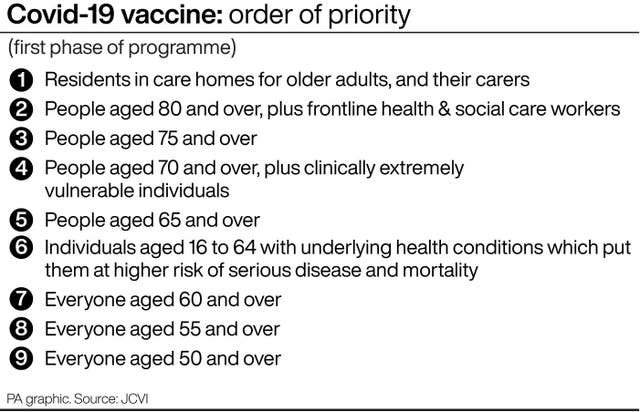New vaccine will be monitored long term to ‘build body of knowledge’
The public can report side effects through the regulator’s Yellow Card system, while a special active monitoring programme has also been set up.

The first Covid-19 vaccine may have received UK regulatory approval, but senior scientists warn this is not the end of the road for safety checks.
Dr June Raine, head of the Medicines and Healthcare products Regulatory Agency (MHRA), insisted “no corners were cut” in the approval process, but monitoring will continue as the jab from Pfizer and BioNTech is rolled out.
Speaking at a Number 10 briefing, Dr Raine said there would “of course” be long-term follow-up data of the vaccine through two mechanisms.
Firstly, recipients of the vaccine can report any side effects they experience via the MHRA’s existing Yellow Card scheme found on its website.
The scheme can be used to report adverse reactions to any drug or vaccine, as well as drugs that are not seemingly manufactured to an acceptable standard, or medicines that a user suspects to be fake.
It is also used to report faulty medical devices.
The scheme flags up “previously unidentified hazards or side effects” to the MHRA that can then undertake further work to get to the bottom of the issue.
In guidance on its website, the MHRA says: “If a new side effect is identified, information is carefully considered in the context of the overall side effect profile for the medicine, and how it compares with other medicines used to treat the same condition.”
It states only in “rare circumstances” is a drug or vaccine that has been approved by the MHRA removed from the market.
In addition, Dr Raine said members of the public will be invited to join an active monitoring programme specifically set up to gather long-term data on the Covid-19 vaccine.

“Many (people) will get a letter,” she said.
“It will be by random allocation, inviting them to join this, so please help us to continue to build that body of knowledge about this vaccine.”
Dr Raine said the existing data used to approve the vaccine was “very robust”.
Professor Sir Munir Pirmohamed, of the Commission on Human Medicines Expert Working Group (CHM), said: “Those that had adverse effects, they were mild and short-lasting, usually lasting only a day or two – similar to the effects you get after any other vaccine.”
About 40,000 people were involved in the vaccine trials, with half receiving the vaccine and half receiving a placebo.
The Joint Committee on Vaccination and Immunisation (JCVI) also states in its guidance that the new vaccine “appears to be safe and well-tolerated, and there were no clinically concerning safety observations”.
Another challenge for the long-term monitoring process is gathering data on vaccine coverage, particularly among poorer communities and people in high-risk groups.

In advice submitted to the Government on how to prioritise different groups for vaccination, the JCVI said in reviewing data it would focus “on inequalities, and the impact of actions being undertaken to mitigate inequalities”.
The Drug Safety Research Unit, an independent body conducting post-market drug safety studies, welcomed the vaccine’s approval but warned it is a “milestone in the development of the vaccines, not the end of the process”.
The unit said: “Post-authorisation safety studies must be fully transparent, report quickly in as near real time as possible and be conducted independently rather than by the vaccine manufacturer.”
It emphasised the importance of “spontaneous reporting” of side effects, and of patients and healthcare staff knowing how to use the Yellow Card reporting system.
The Drug Safety Research Unit is planning to conduct its own active surveillance study on the Covid-19 vaccine.





